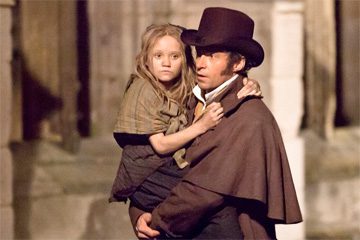Surely the most noteworthy innovation in the film version of Les Misérables is the addition of a new song. “Suddenly,” sung by Jean Valjean after he rescues Cosette from the Thenardiers, is a brand new addition to Les Mis. How does it function in the story? Does it help? And is it faithful to the novel?

In my last two blog posts (Fact Check, Script Changes), I have been evaluating differences between the stage and film versions of the musical Les Misérables, comparing these to Victor Hugo’s novel. So far, I have found that the innovations in the movie script are both faithful to the book and helpful to the viewer, especially the viewer who is unfamiliar with Les Mis. But what about the new song, “Suddenly”? Does it also help the viewer understand what’s going on in the story? Is it also faithful to Hugo’s initial telling of that story?
To both questions I would answer with an enthusiastic “yes.” “Suddenly” is helpful to the viewer and it is most faithful to the novel. Allow me to explain.
In the stage version of Les Mis, when Jean Valjean “buys” Cossette from the Thenardiers, there is a brief dialogue between the two of them:
VALJEAN
Come, Cosette, come, my dear
From now on I will always be here
Where I go, you will be.
COSETTE
Will there be children
And castles to see?
VALJEAN
Yes, Cosette,
Yes, it’s true
There’s a castle just waiting for you…
Then, we are immediately transported in time and place to Paris, nine years later. We have no idea what happened in the interim. All we know is that Cosette is now a young woman and that she and her “father” are in Paris, soon to encounter old foes.
In the novel, there is no such abrupt transition. Rather, Hugo spends many chapters explaining how Jean Valjean and Cosette settled in Paris, how they eluded Javert, and how they ended up living in a convent. All of this happens when Cosette is still a young child. Also, during this segment of the novel, we discover the deep connection between Valjean and Cosette, the power and purity of their love.
The movie fills in the blanks left open by the musical, following the basic storyline of the book. For example, when Valjean lifts Cosette into a coach, we find this bit of new dialogue:
VALJEAN
Where I go, you will be.
COSETTE
Will you be like a Papa to me?
VALJEAN
Yes, Cosette! This is true!
I’ll be father and mother to you!
Victor Hugo introduces the notion of Jean Valjean as a mother to Cosette shortly after they depart from the Thenardiers. We read in the novel:
All the passion and affection within him awoke, and rushed towards that child. He approached the bed, where she lay sleeping, and trembled with joy. He suffered all the pangs of a mother, and he knew not what it meant; for that great and singular movement of a heart which begins to love is a very obscure and a very sweet thing.
Chalk one up for the faithfulness of the movie! Ditto with the movie’s depiction of the interaction of the Thenardiers after Valjean and Cosette depart.
But then we get to the most striking innovation in the movie script, a new song called “Suddenly.” It is sung by Jean Valjean while he and Cosette are traveling by coach to Paris. Here are the lyrics (thanks to Zack, whose comment below helped me to get them right).
Suddenly you’re here
Suddenly it starts
Can two anxious hearts
Beat as one?
Yesterday I was alone
Today you walk beside me
Something still unclear
Something not yet here
Has begun.
Suddenly the world
Seems a different place
Somehow full of grace
Full of light.
How was I to know
That so much hope
Was held inside me?
What has passed is gone
Now we journey on
Through the night.
How was I to know at last
That happiness can come so fast?
Trusting me the way you do
I’m so afraid of failing you
Just a child who cannot know
That danger follows where I go
There are shadows everywhere
And memories I cannot share
Nevermore alone
Nevermore apart
You have warmed my heart
Like the sun.
You have brought the gift of life
And love so long denied me.
Suddenly I see
What I could not see
Something suddenly
Has begun.
Before we get to the close connection between “Suddenly” and Victor Hugo’s writing, I would say that even if the text of this song does not precisely mirror anything in the book, it faithfully relates the dawning of love in the heart of Valjean. It also helps to explain why, later in the story, he has such a hard time letting go of Cosette. So, one could argue that “Suddenly” belongs in the script because it helps the viewer understand what is going on in the story and in Jean Valjean, in particular.
But this song is not only helpful. It is also extremely faithful to the novel. Here are a few excerpts from the chapter called “Two Misfortunes Make One Piece of Good Fortune.” I have highlighted a few phrases:
On the following morning, at daybreak, Jean Valjean was still by Cosette’s bedside; he watched there motionless, waiting for her to wake. Some new thing had come into his soul. Jean Valjean had never loved anything; for twenty-five years he had been alone in the world. He had never been father, lover, husband, friend. In the prison he had been vicious, gloomy, chaste, ignorant, and shy. . . .
When he saw Cosette, when he had taken possession of her, carried her off, and delivered her, he felt his heart moved within him. All the passion and affection within him awoke, and rushed towards that child. He approached the bed, where she lay sleeping, and trembled with joy. He suffered all the pangs of a mother, and he knew not what it meant; for that great and singular movement of a heart which begins to love is a very obscure and a very sweet thing. Poor old man, with a perfectly new heart! Only, as he was five and fifty, and Cosette eight years of age, all that might have been love in the whole course of his life flowed together into a sort of ineffable light.
It was the second white apparition which he had encountered. The Bishop had caused the dawn of virtue to rise on his horizon; Cosette caused the dawn of love to rise. . . .
Nature, a difference of fifty years, had set a profound gulf between Jean Valjean and Cosette; destiny filled in this gulf. Destiny suddenly united and wedded with its irresistible power these two uprooted existences, differing in age, alike in sorrow. One, in fact, completed the other. Cosette’s instinct sought a father, as Jean Valjean’s instinct sought a child. To meet was to find each other. At the mysterious moment when their hands touched, they were welded together. When these two souls perceived each other, they recognized each other as necessary to each other, and embraced each other closely.
The song, “Suddenly,” not only depicts the extraordinary impact of Cosette upon Jean Valjean, but also, brilliantly, plays off a word in Hugo’s novel. (In the French original, Hugo employed the word brusquement, which means “suddenly” or “abruptly.” This word appears many times throughout the novel. The first English translator of Les Misérables, Isabel F. Hapgood, rendered brusquement as “suddenly.” Other translations prefer “abruptly,” which wouldn’t work as well in a song.)
“Suddenly” also reveals the fears of Valjean’s heart: “Just a child who cannot know That danger follows where I go There are shadows everywhere And memories I cannot share.” This prepares us for what is to come, when Valjean refuses to tell Cosette his secrets and when he is haunted by the “shadows of the past.”
More importantly, the song helps us understand the relationship between the Bishop’s impact on Jean Valjean and Cosette’s impact. Hugo makes this connection when he writes: “The Bishop had caused the dawn of virtue to rise on his horizon; Cosette caused the dawn of love to rise.” Truly, Valjean’s encounter with God’s grace through the Bishop changed his life. He became a man of virtue, one who was committed to doing what was right and respecting all human beings. Yet, only through Cosette did Valjean begin to experience love.
In another crucial place in the movie, the script underscores this same point. I’ll say more in my next post.












